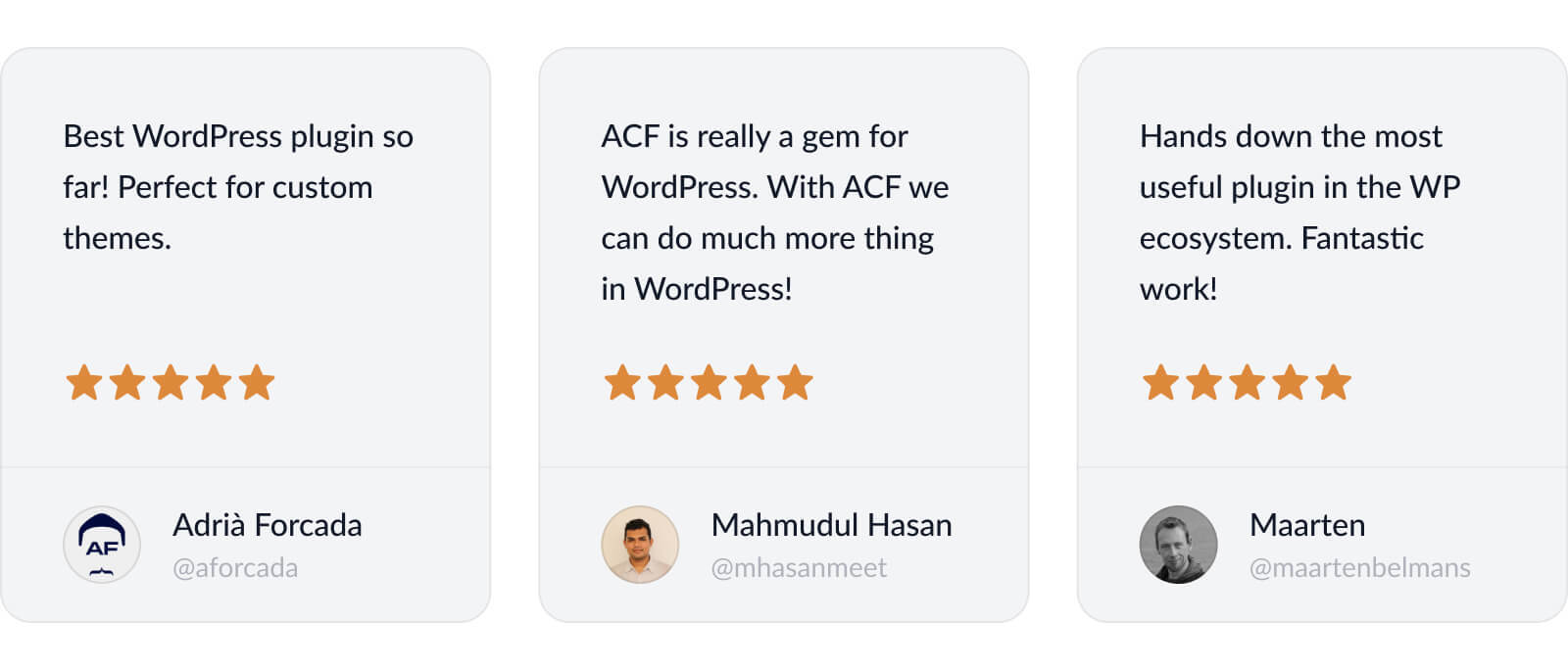As we bid farewell to 2023, ACF has continued to thrive and expand its capabilities. We’ve made great strides in introducing new features and enhancements to the plugin, while the new annual survey, feedback board, and ACF Chat Fridays have allowed us to work closer with our users than ever before.
TL;DR – Releases in 2023 made it possible for developers to install ACF PRO with Composer, brought custom post type and taxonomy registration into the plugin, introduced a UI for the Options Pages feature, brought in native bidirectional relationships, and packed numerous bug fixes and improvements into 12 other minor and beta releases.
Let’s take a look back at 2023:
- Achievements
- Plugin Releases
- Website Improvements
- User Feedback and Community Growth
- What’s Ahead in 2024?
- Thanks
Achievements
ACF was fortunate enough to earn awards in two different user-voted competitions in 2023.
In April, ACF took the top spot in Torque Magazine’s annual Plugin Madness competition. ACF won the inaugural Plugin Madness in 2016, and made an appearance on the bracket every year since.
Results from the WP Awards were announced in December, with ACF earning the most votes in the Dynamic Data Plugins category, as well as receiving the most votes in any category. This marks the second year in a row ACF has earned this distinction.
It’s great to see ACF recognized like this, but I also love seeing individual users recognizing just how useful ACF is for them:
Plugin Releases
We started off 2023 with ACF 6.0.7, but it was the second release of 2023, ACF 6.1, that really got people talking. It introduced the ability to create custom post types and taxonomies directly within the plugin. This was one of our most often requested features, and now registering post types and taxonomies in ACF’s UI is as slick and intuitive as creating field groups and fields:
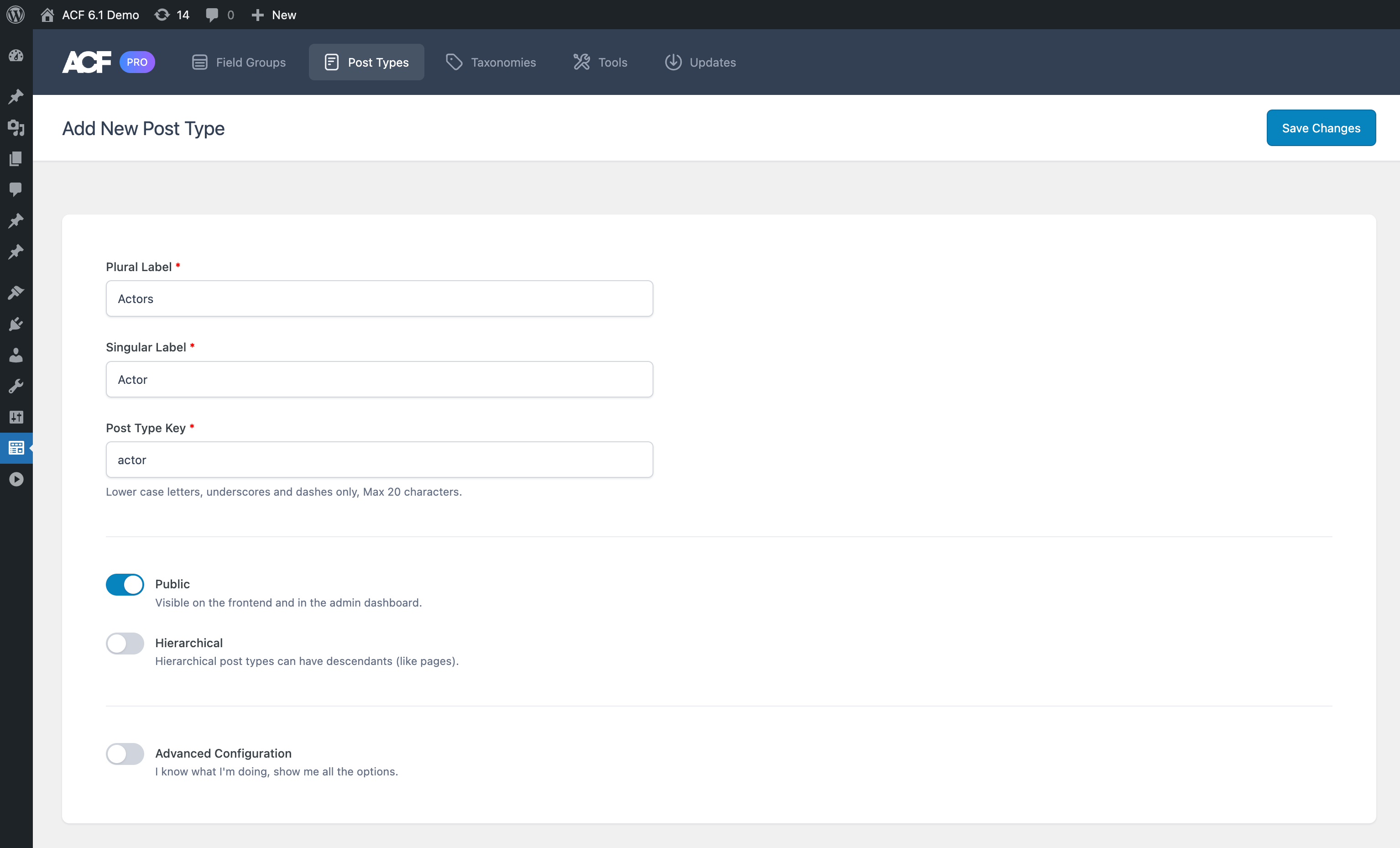
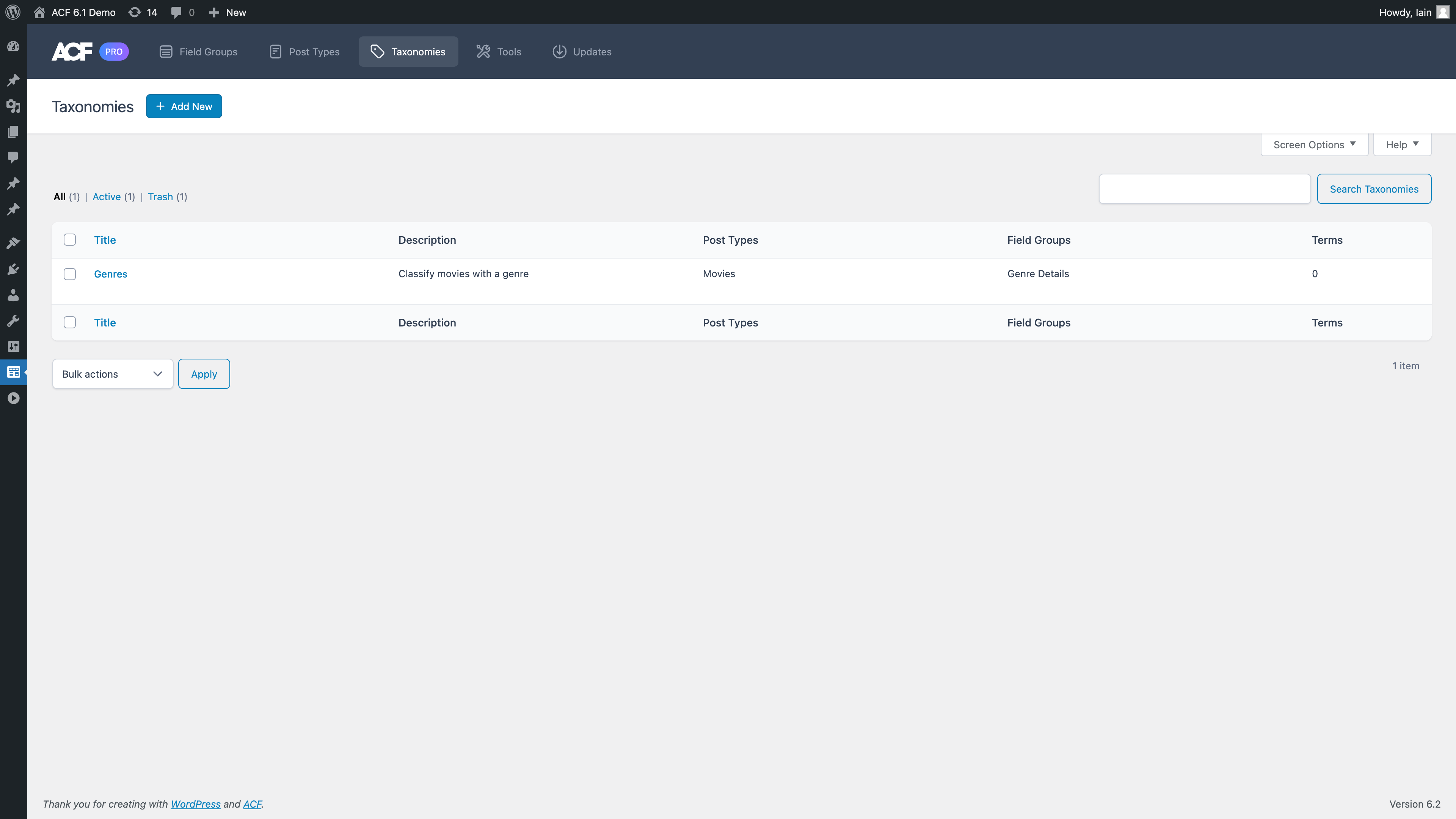
This release also updated ACF’s JSON sync, import, and export tools to include post types and taxonomies registered with ACF.
Field Selection Modal
The dropdown field selection menu wasn’t always clear, especially for new users. ACF 6.1 introduced the “Browse Fields” button, which opens a modal showcasing field types in a way that’s easy to search and informative, including descriptions, visual representations, and links to documentation.
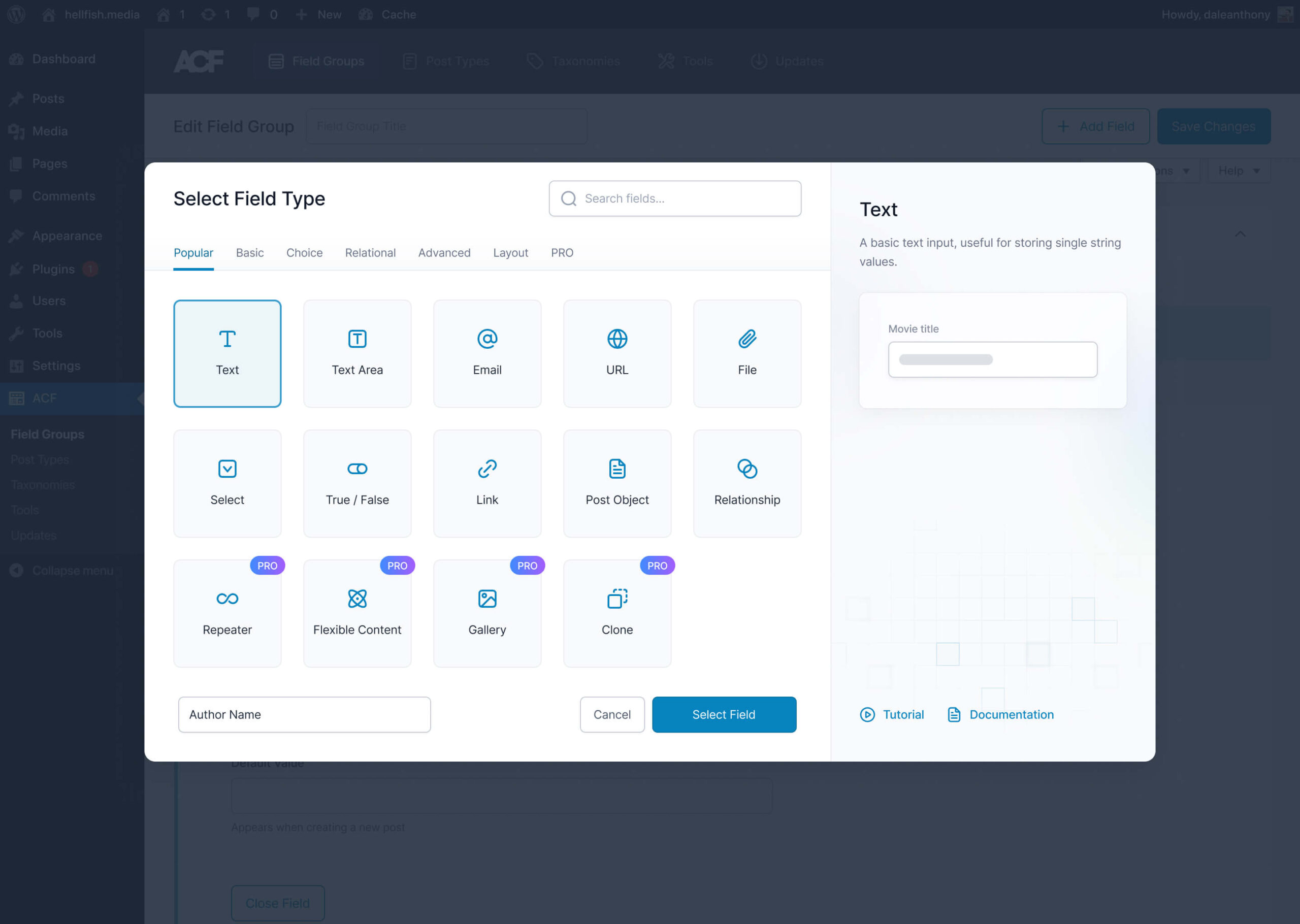
ACF 6.1 included a host of other improvements, such as full compatibility with PHP 8.1 and 8.2, the ability to filter the post status for post objects fields, customizable field settings tabs, and improved test coverage.
Options Page UI
The development team kept up a regular cadence of bug fix and enhancement releases over the next few months, culminating in the release of ACF 6.2 in early August. This release introduced the ability to create options pages right from the plugin admin UI in ACF PRO, brought bidirectional relationship functionality natively to the plugin, and included enhanced support for registering multiple locations for JSON files.
The Options Page feature in ACF PRO allows you to register global, site-wide fields and place them on new pages in the WordPress admin. This has long been a feature of ACF PRO, but prior to ACF 6.2, they would have to be registered using a code snippet. This wasn’t ideal for workflow, as you had to create field groups, save them, go to your code editor to register the page, and then reload the field group editor to select the options page in the location rules.
ACF PRO 6.2 introduced a UI to do this within the plugin, making it possible to create settings and child pages with just a few clicks:
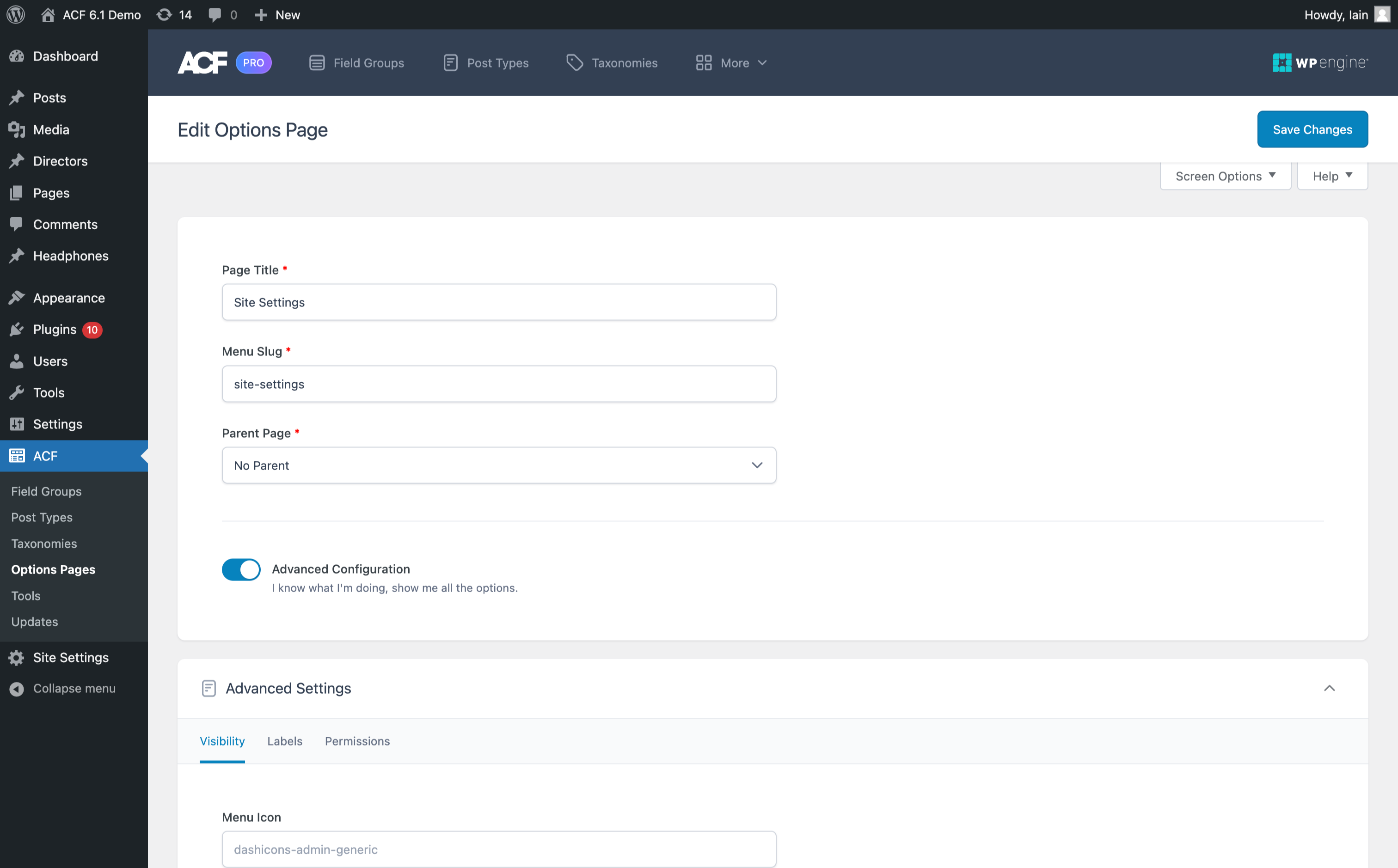
Bidirectional Relationships
ACF’s Relationship, Post Object, User, and Taxonomy fields types give you the ability to create relationships between data objects, but this connection was only one way. Bidirectional relationships required a code snippet or a third-party plugin.
That changed with the release of ACF 6.2. The four relational field types now have an “Advanced” settings tab, with a toggle allowing you to turn on bidirectional mode and set the field to store the connection data on the other side of the relationship.
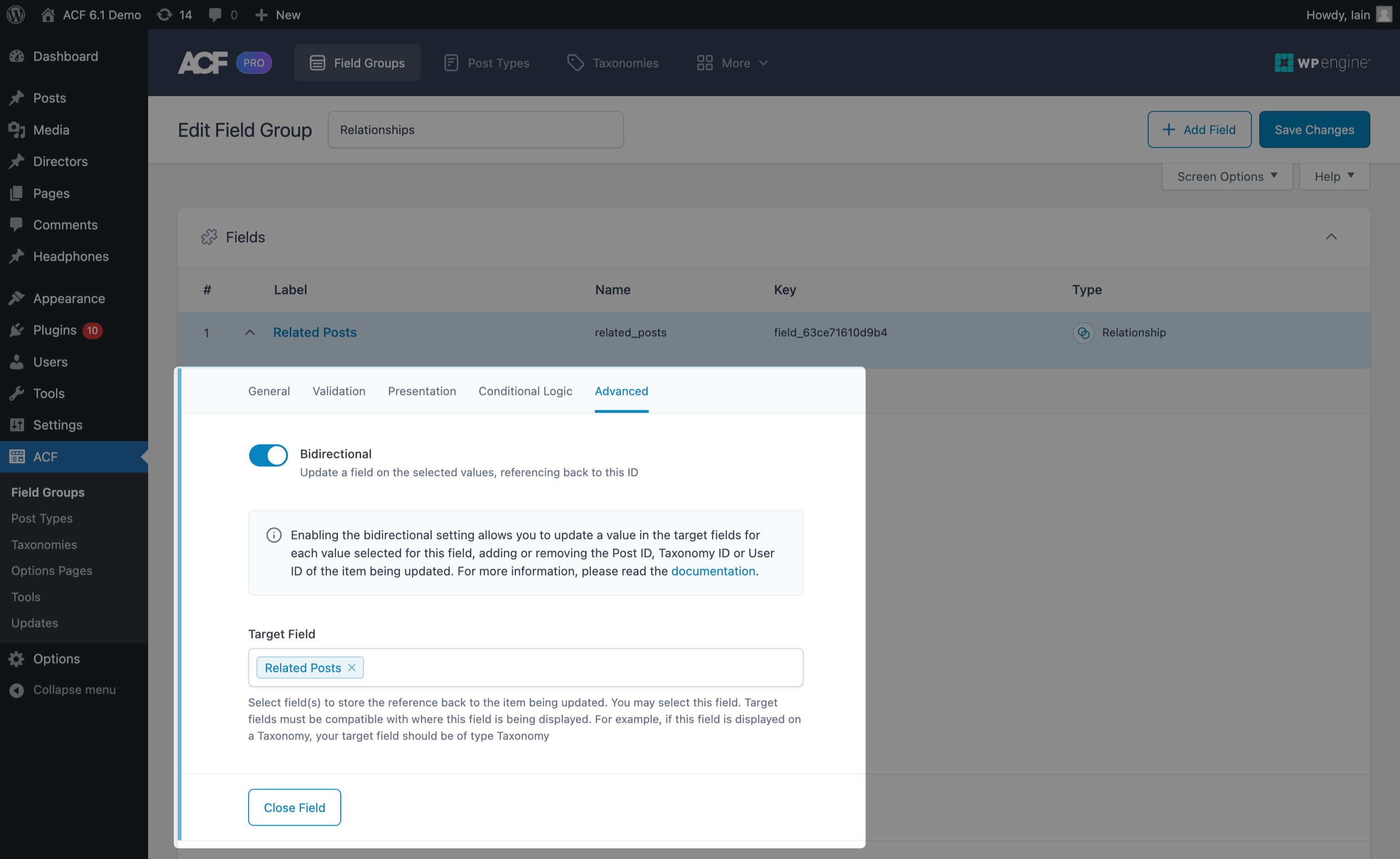
More enhancement, bug fix, and security releases followed in the closing months of 2023, culminating in the release of ACF 6.2.4 in late November.
Other Improvements
Along with working on our internal testing and release processes to continually improve the quality of the plugin’s codebase and how fast we can release updates, we also shipped three security fix releases to patch security issues in the plugin. We plan to be even more proactive in finding ways to improve the security of ACF in 2024.
In August, we raised the minimum required PHP version to 7.0 and the minimum required WordPress version to 5.8 to encourage users to update the sites and servers that run ACF.
Website Improvements
We introduced first-party Composer support for installing ACF PRO early in 2023. This was an exciting development for many of our users, but it turns out we were just getting started.
We’ve significantly improved our documentation for ACF Blocks, including an ongoing series of tutorials. If you’re new to ACF Blocks, get started with Create Your First ACF Block, and then move on to more advanced concepts like How to Use Block Locking and Using InnerBlocks and Parent/Child Relationships.
Prefer a video format? We’ve got you covered:
We’ve also introduced or updated tutorials on Conditional Logic, How to Create an Options Page, How to Query Posts by Custom Fields, and made other improvements to our documentation. This is an ongoing project, so please make sure to let us know where our documentation could be improved, and what new tutorials you’d like to see.
User Feedback and Community Growth
It was a big year for releases, but 2023 may have been even bigger in terms of direct feedback from users. Throughout the year, we’ve been committed to incorporating feedback and suggestions to ensure that the plugin continues to meet the needs of its users. We’ve actively engaged with the community, encouraging users to share their thoughts and ideas for future improvements.
The launch of ACF Chat Fridays, our regular open office hours session, has given us a great pipeline to direct user feedback on issues they’re experiencing, challenges they’ve solved, and what they’d like to see next. Make sure you’re in the loop and register for the nest session.
This year also saw the introduction of the first-ever annual ACF user survey, helping us to better understand how users are building WordPress sites with ACF, and how we can deliver what will help our users the most. Check out the results of the survey.
In addition, 2023 also marked the creation of our public feedback board, where users can post feature suggestions, vote on others, and track progress of suggestions.
WordCamps in Europe and North America
We like to attend WordCamps when we can, and 2023 saw us at some of the largest WordPress events in the world: WordCamp Europe and WordCamp US in 2023.
Liam Gladdy and I attended WordCamp Europe in Athens, Greece, along with Rob Stinson and other colleagues from WP Engine. We had a great time running product demos at the WP Engine sponsor booth, chatting with customers, and meeting with partners.
A great 2nd day at #WCEU with the @wp_acf team and the rest of the @wpengine folks pic.twitter.com/NtfFVn2MLl
— Iain Poulson (@polevaultweb) June 10, 2023
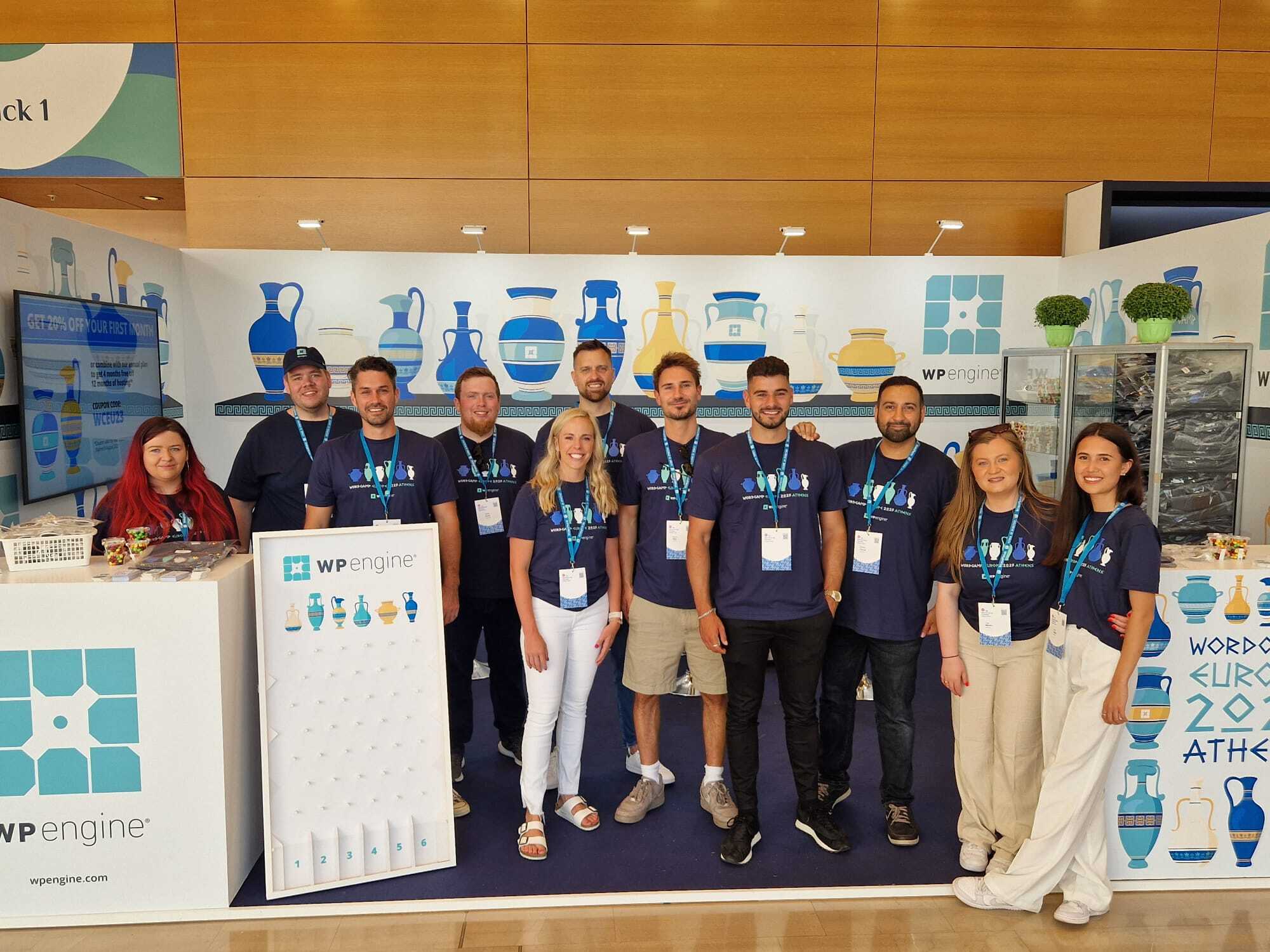
Matt Shaw and Anthony Burchell from the ACF development team, and Damon Cook from WP Engine DevRel attended WordCamp US in National Harbor Maryland, and reported a similar experience. We hope to see you at a WordCamp in 2024!
DE{CODE} 2023
Naturally, we were also present at what might be the world’s largest virtual WordPress event: DE{CODE} 2023. Hosted by WP Engine, DE{CODE} is a 100% virtual event dedicated to helping WordPress developers build smarter, maximize conversions, and modernize the user experience.
Our presentation, “7 Things You Didn’t Know You Could Do With Advanced Custom Fields,” covered some of ACF’s lesser-known features, including some that were revealed to the public for the first time at DE{CODE} 2023. You can catch the whole presentation in the player below.
We’ll have more exciting news at DE{CODE} 2024, taking place March 19 (North America/APAC) and March 21 (EMEA), so make sure to mark your calendars and keep an eye on Twitter for news about the conference agenda.
Statistics
Let’s take a look at some of the stats from the past year.
Development
The engineering team has done another stellar job in 2023:
- Shipped 2 major releases
- Shipped 14 minor releases, release candidates, and betas
- Pushed 2,211 commits of code (+12% from 2022)
Support
The support team has always been a big part of ACF, and they continued to do a great job in 2023:
- Answered a total of 9,899 tickets
- Sent a total of 19,567 replies
- An average of 825 tickets per month
- Average customer satisfaction score of 92.5%
Community Engagement Stats
- Held 19 sessions of ACF Chat Fridays
- Surveyed 2,031 users in our first annual survey
- Published 76 blog posts, tutorials, and updated docs
- Held 9 WP Engine Builder sessions dedicated to ACF
Usage
The free version of ACF is at 2 million+ installs, with WordPress.org reporting that over 46% of them are running ACF 6.2:
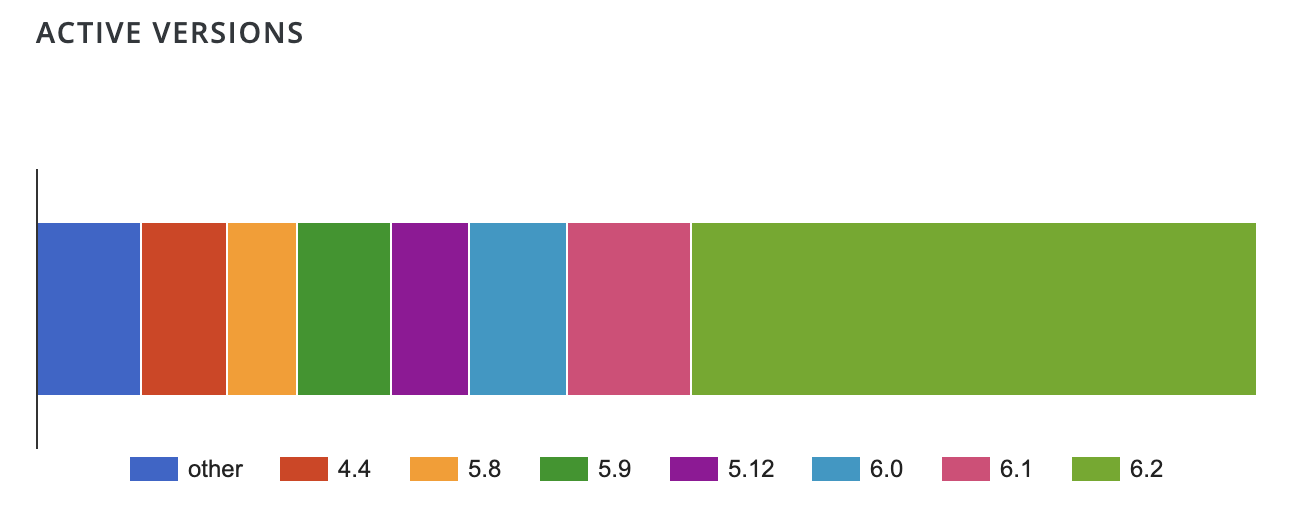
Let’s have a look at data about sites that activated ACF PRO in 2023:
ACF Major Version
| ACF version | % sites |
|---|---|
| 6.2 | 68.4% |
| 6.1 | 21.3% |
| 6.0 | 9.5% |
WordPress Version
| WP version | % sites |
|---|---|
| 6.4.1 | 24.6% |
| 6.4.2 | 12.9% |
| 6.3.2 | 12.8% |
| 6.2.2 | 12.4% |
| 6.1.1 | 10.4% |
| 6.3.1 | 8.3% |
PHP Version
| PHP version | % sites |
|---|---|
| 7.4 | 37.3% |
| 8.1 | 22.9% |
| 8.0 | 20.0% |
| 8.2 | 17.2% |
| 7.3 | 1.4% |
| 7.2 | 0.6% |
What’s Ahead in 2024?
Our first major release of 2024, ACF 6.3, will focus on improvements and enhancements to ACF Blocks. The first of these is introducing field validation for fields contained within ACF Blocks. Many ACF fields allow you to set parameters for the input they will accept, and reject any input that falls outside those parameters. Historically, this validation wasn’t available for fields included in ACF Blocks. This will change with the release of ACF 6.3.
The second new feature for ACF 6.3 involves how field data is saved in ACF Blocks. When you create an ACF Block and add content to it in the content editor, the field data in that block is saved the same way WordPress saves the rest of the block editor information: to the post content column in the post table. However, some users would prefer to store the field data from their ACF Blocks in post meta, like classic ACF fields do. We’re working on a way to give you control over where that field data is saved when you create the block. This should make it easier to access this data for sorting and querying.
That’s the relatively near future. Looking further ahead for 2024, we’re working on a way for folks building headless WordPress sites or decoupled front end components to skip the PHP template stage when creating ACF Blocks. ACF is widely used in headless builds, so we’re examining ways to define paths to front end components in block.json, and then use the same component in the editor to show a preview of the block.
We’re constantly improving the UI and UX of ACF Blocks to make editing blocks as native as possible, and 2024 should have some enhancements along those lines. This is a long-term project, but we’re hopeful that editing ACF Blocks will be no different to core blocks.
We’re also planning enhancements to conditional logic for relational field types, Flexible Content field layouts, and much more. Make sure to sign up for our mailing list for the latest news.
Thanks
I’d like to thank the entire ACF team and everyone else at WP Engine for making these achievements possible in 2023, and ensuring we’ll continue to build on that success throughout 2024.
As always, my biggest thanks are reserved for our users. We asked for your feedback, and you delivered, helping to ensure that ACF continues to meet your needs. The development process is enriched and improved because of your participation.
What else would you like to see from ACF as we move forward into 2024? Let me know in the comments.
About the Author
For plugin support, please contact our support team directly, as comments aren't actively monitored.
